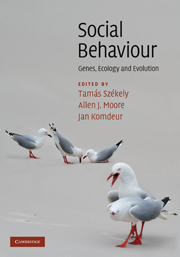Introduction: The uphill climb of sociobiology: towards a new synthesis
Published online by Cambridge University Press: 05 June 2012
Summary
Social behaviour garners broad interest: biologists, social scientists, psychologists and economists all incorporate a consideration of social behaviour in their studies. This breadth of interest is unsurprising, as the vast majority of animals (and all that reproduce sexually) live partly (or fully) in social environments. As Robert Trivers (1985) succinctly put it, ‘Everybody has a social life.’ Some of this interest undoubtedly emerges because members of our own species (Homo sapiens) live in extensive societies and spend much time interacting with each other. Yet you do not have to be human for social behaviour to have a strong influence on biological processes. The significance of social behaviour is easy to see: if you isolate an ant, a fish or a bird from its peers in a sort of Kaspar Hauser setup, within a short time many of its ‘normal’ behaviours will change and be impaired. Social behaviour, heuristically defined as activities among members of the same species that have fitness consequences for both the focal individual and other individuals in the group, is thus ubiquitous.
The perplexing causes and far-reaching implications of social behaviour make it a rich subject to help understand evolution (Gardner & Foster 2008). The understanding of social evolution is challenging, given that social behaviour is often costly. Furthermore, unlike many traits that are passively selected by the environment, in the context of social behaviour the animals create selection for themselves by interacting with each other.
- Type
- Chapter
- Information
- Social BehaviourGenes, Ecology and Evolution, pp. 1 - 4Publisher: Cambridge University PressPrint publication year: 2010



